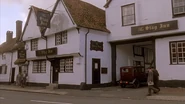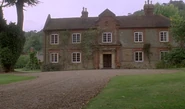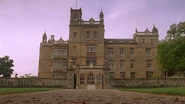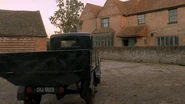Taken at the Flood is the fourth episode of series ten of Agatha Christie's Poirot, first broadcast on 2 April 2006. The feature-length episode was based on the Agatha Christie novel of the same name. It was directed by Andy Wilson, and the script was written by Guy Andrews.
Synopsis[]
The young Rosaleen Cloade and her brother David are the only survivors of a gas explosion. The naive widow now inherits all of her late husband's fortune, to the detriment of his relatives. They turn to Poirot and ask him to convict the girl of bigamy by finding her first husband, Robert Underhay, who went missing in the African djungle.
Cast[]
- David Suchet as Hercule Poirot
- Jenny Agutter as Adela Marchmont
- Patrick Baladi as Rowley Cloade
- Eva Birthistle as Rosaleen
- Elliot Cowan as David Hunter
- Amanda Douge as Lynn Marchmont
- Penny Downie as Frances Cloade
- Richard Durden as Pebmarsh
- Claire Hackett as Beatrice Lippincott
- Richard Hope as Supt. Harold Spence
- Celia Imrie as 'Aunt' Kathy Cloade
- Nicholas Le Prevost as Major James Porter
- Tim Pigott-Smith as Dr Lionel Woodward
- Elizabeth Spriggs as Mrs Leadbetter
- Pip Torrens as Jeremy Cloade
- Tim Woodward as Enoch Arden/Charles
- David Yelland as George
- Martha Barnett as Rosaleen before the explosion
Comparison with Original Novel[]
The adaptation is fairly faithful to the original, albeit omitting its post-WWII setting (like most ITV adaptations, the episode is set in the 1930s), changing the backstories of some characters, magnifying the extent of the murderer's crimes and adding some criminal side-plots for characters who were innocent in the original novel.
The film adaptation deviates from the source material in these respects:
Characters[]
- Katherine (Aunt Kathie) and Adela are both Gordon's sisters in the film, instead of being sisters-in-law as in the novel (where Adela is Gordon Cloade's sister and Katherine married into the family). Thus, Kathie's husband is now named Lionel Woodward instead of Lionel Cloade.
- In the film, Major Porter is Poirot's friend (and not a tedious club bore as in the book). He is also an invalid in a wheelchair with a scorched face, as he went to catch a glimpse of Rosaleen in London when the building was blasted, instead of merely hearing about his death after the fact.
- Poirot is also acquainted with Jeremy Cloade (who in the book is a silent by-stander not known to the Detective) and knows Jeremy's niece Lynn, whose father has been a good friend of Poirot's. The Detective has last seen Lynn as a child, but has been writing letters to her and is very fond of her.
- The Detective knows the landlady of the Stag Inn, Miss Lippincott, as well as the regular guest Mrs Leadbetter. It is stated that he has stayed in the inn a few times before, whereas in the book, he comes to Warmsley Vale for the first time.
- In the book, Lynn Marchmont comes home from the war; in the film, she returns from a four years' stay in the African jungle where she has been managing a hospital. She has also been engaged for four years to Rowley in the film, instead of getting engaged to him six years prior, before the outbreak of the war.
- David Hunter is an engineer in the film, and not a "ne'er-do-well" ex-soldier who has led a rough life. He has a scar from the explosion on his left cheek .
- Mrs Leadbetter now has a lapdog named Count Bismarck.
Plot elements[]
- The timeline of the film is much compressed: only several days after Poirot hears Major Porter's story (told in flashbacks), he gets a visit by Aunt Kathie. The Detective then promptly travels to Warmsley Vale to attend the annual do at Furrowbank, and thus gets involved in the events there much earlier than in the novel, before the actual murder occurs.
- When Major Porter tells his story about Rosaleen at the club, he recounts it only to Poirot who gives him his full attention and asks questions. The same day as the building was blasted and the Major got injured, the rest of the Cloades (except for Lynn who was in Africa) also went to London to meet Gordon, and the blast occured just when they got out of the car. In the book, neither the Major nor the Cloades were in London during the explosion.
- In the book, the blast was caused by a bomb during the Blitz; in the movie, it was believed to be the result of gas explosion.
- After his conversation with Porter, Poirot has dinner with his club friend Jeremy Cloade, whom he does not know in the book. Jeremy passes to Poirot Lynn's invitation to the annual do at Furrowbank. In the novel, Poirot never attended the party, which was a one-time event held by Aunt Kathie on the occassion of Lynn's homecoming.
- When Aunt Kathie visits Poirot in the film, she does not mention her debts as the main reason why she had come. It is left unclear whether or not the Detective shall help the family to find Underhay, or simply come to Warmsley Vale to attend the annual fete at Furrowbank. In the novel, he does not attend the party and refuses to help Katherine.
- Mrs Leadbetter is now usually to be found at the window in the inn's Lounge, as the room 'For Residents Only' does not appear in the film.
- Lynn's homecoming party is held at Furrowbank and it is a much more splendid affair than in the book, everyone is wearing black tie and other people than the Cloade family are present, including Poirot.
- Instead of approaching Rosaleen some days after the fete as in the book, Frances asks her for money in private directly at the party. In the book, David Hunter interrupts them before Francis even gets to the point of her visit and refuses to lend her money mainly because he has just had a tumultuous conversation with Lynn. In the film, Rosaleen manages to write Frances a cheque but David intercepts their exchange and humiliates Frances in front of everyone at the party, out of pure nastiness.
- In the film, Rosaleen and David cannot leave Furrowbank because it cannot be sold until the death duties are signed off. In the book, no reason for their staying is given, except for David's enjoyment of the Cloades' situation.
- Rosaleen was made into a morphine addict.
- Kathy becomes Adela's sister, whereas in the novel, it is Lionel who is a Cloade. The credits mistakenly refer to Lionel as a Cloade - however, his surname is 'Woodward' (as revealed by Kathy when she visits Poirot at the beginning of the adaptation).
- In the film, the false Rosaleen is saved in time, and Poirot proves that David, knowing that she would attempt suicide out of feelings of guilt for her actions, has set it up so that she would use the morphine as a means to try to kill herself.
- The death of Gordon Cloade was not caused by a German air raid, but was thought to be due to a gas explosion. This was later shown by Poirot to be caused by a bomb planted by David Hunter.
- The film appears, like much of the TV series, to have been reset in the 1930s.
- In the end, after David is hanged, Lynn leaves England for Africa because she is still in love with David despite everything.
- She does not marry Rowley as implied in the novel.
Final revelations[]
- The signature scene in which Poirot reveals all takes place in the lounge of the Stag inn with the entire Cloade clan, David and Rosaleen present. This scene is much more intimate in the book, where Poirot comes to the Long Willows farm and narrates his story only to Lynn, Rowley and David.
- Aunt Kathie is revealed to be the anonymous caller who has been torturing Rosaleen, threatening her and calling her names. In the novel, Katherine is entirely innocent.
- David Hunter is a much more ruthless murderer in the film.
- He cold-bloodedly orchestrated the "gas" explosion in which his sister, her husband and the entire household died. He himself and the maid, Eileen Corrigan, hid in the cellar, the maid later assuming the role of Rosaleen. David told her to cut him on the cheek so that their surviving the accident would look real. He then forced to have an abortion when she was expecting his child to further play on her bad conscience, and continued to abuse her and dictate every aspect of her life. In the book, none of this happened. Rosaleen and her husband get killed in the Blitz and David Hunter and Eileen survive by a lucky coincidence. Only then does David seize his chance and persuade the bed-ridden maid to play Rosaleen's part, so as to get rich. He also comes across as gentler and well-meaning in his "every-day" behaviour towards her.
- David now controls Rosaleen via addictive drugs, namely morphine. This allows Dr Lionel (who was a completely harmless drug addict in the book) to steal some from Rosaleen when he inspects her and fill the vials with oil. Thanks to this, Rosaleen survives the overdose, which was a one-time event fatal for her in the book.
- After the revelation, David threatens to blow the whole place up with a lighter, as he has planted explosive devices under it. Lynn persuades him not to, out of his love for her. David later reveals that he was only bluffing and meekly gets escorted out by the police. A scene from his hanging is added to the film, in which he gently sings In the book, he simply tries to run for it, but is intercepted by the police only a short while later and admits that he has lost. The gravity of his sentence is not known.
Tropes and themes[]
- 1930s aesthetics
- Folk song "Your Baby Has Gone Down the Plughole" – first mentioned by Rosaleen during the inquest as a song often hummed by Robert Underhay, then sung by David Hunter in his last scene
- Poirot's quirks
- Demanding clarification of English idioms – to Spence: "When Monsieur Hunter professes himself to have no position, does that mean he considers himself to be a gentleman of leisure?"
- Ambivalent feelings about English food – refuses a humbug from Inspector Spence
Filming Locations[]
- Dorchester on Thames
- Crescent Grove, London - explosion at Gordon Cloade's house
- Chilworth Manor, Chilworth, Guildford, Surrey – as the White House
- Englefield House, Theale, Reading – as Furrowbank[4]
- St. Marks Church, off The Street, Englefield, Reading
- Stocker's Farm, Rickmansworth - as Rowley Cloade's farm
- Savile Club, Mayfair - Poirot dines with Jeremy Cloade
- Rosehill, Henley-On-Thames, Oxon, RG9 3EB
Gallery[]
Promotional Videos[]
See Also[]
References[]
- ↑ https://www.waymarking.com/waymarks/WMMM9Y_The_George_Henley_Road_Dorchester_Oxon_Poirot_Taken_At_The_Flood_2006
- ↑ https://www.waymarking.com/waymarks/WMMM77_Abbey_Church_Dorchester_Oxon_Poirot_Taken_At_The_Flood_2006
- ↑ https://www.waymarking.com/waymarks/WMMMA1_Rotten_Row_Dorchester_on_Thames_Oxon_Poirot_Taken_At_The_Flood_2006
- ↑ https://www.imdb.com/title/tt0478227/locations?ref_=tt_dt_loc















